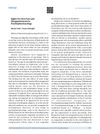 14 citations,
January 2017 in “Elsevier eBooks”
14 citations,
January 2017 in “Elsevier eBooks” CBG may help with various medical conditions but needs more human research to confirm safety and effectiveness.
 2 citations,
March 2004 in “Reviews in Gynaecological Practice”
2 citations,
March 2004 in “Reviews in Gynaecological Practice” Hormonal changes and psychological issues can cause sexual dysfunction in postmenopausal women. Behavioral therapy is recommended first, with hormone replacement helping some symptoms but not libido. Testosterone can improve libido, but its effects on overall sexual function are unclear. Emotional and relationship issues should be addressed before using medication, and the benefits and risks of testosterone supplementation should be considered.
[object Object]  62 citations,
July 1993 in “Journal of Investigative Dermatology”
62 citations,
July 1993 in “Journal of Investigative Dermatology” Hair growth is influenced by interactions between skin layers, growth factors, and hormones, but the exact mechanisms are not fully understood.
 38 citations,
April 2018 in “Psychopharmacology/Psychopharmacologia”
38 citations,
April 2018 in “Psychopharmacology/Psychopharmacologia” Blocking CRF-R1 can reduce alcohol intake in stressed mice.
 34 citations,
April 2014 in “Psychopharmacology”
34 citations,
April 2014 in “Psychopharmacology” Stress and alcohol affect brain chemicals differently in rats, mice, and humans, influenced by genetic differences.
 22 citations,
February 2008 in “Journal of Neurochemistry”
22 citations,
February 2008 in “Journal of Neurochemistry” Minoxidil prevents serotonin loss from MDMA by affecting potassium channels and increasing Akt phosphorylation.
 June 1995 in “International Journal of Gynecology & Obstetrics”
June 1995 in “International Journal of Gynecology & Obstetrics” Women with hair loss have higher androgen levels, while men with early balding have altered androgen ratios.
 1540 citations,
October 2008 in “Fertility and Sterility”
1540 citations,
October 2008 in “Fertility and Sterility” The report concludes that PCOS is mainly a condition of excess male hormones and its definition may change as new information is discovered.
 237 citations,
January 2010 in “The Journal of Sexual Medicine”
237 citations,
January 2010 in “The Journal of Sexual Medicine” The report recommends personalized treatment for women's sexual dysfunctions and more research on effective therapies.
 212 citations,
September 2015 in “Journal of Investigative Dermatology”
212 citations,
September 2015 in “Journal of Investigative Dermatology” The document provides a method to classify human hair growth stages using a model with human scalp on mice, aiming to standardize hair research.
 117 citations,
November 2006 in “Experimental Dermatology”
117 citations,
November 2006 in “Experimental Dermatology” The article concludes that the wool follicle is a valuable model for studying tissue interactions and has potential for genetic improvements in wool production.
[object Object]  91 citations,
August 2014 in “Development”
91 citations,
August 2014 in “Development” The circadian clock is crucial for tissue renewal and regeneration, affecting stem cell functions and having implications for health and disease.
 87 citations,
May 2012 in “PLOS Genetics”
87 citations,
May 2012 in “PLOS Genetics” Six new genetic regions linked to early hair loss also connect to Parkinson's disease and prostate cancer, possibly leading to new treatments.
 75 citations,
June 2019 in “International Journal of Molecular Sciences”
75 citations,
June 2019 in “International Journal of Molecular Sciences” Costunolide may have multiple health benefits, including promoting hair growth and protecting against cancer and diabetes, but more research is needed.
 74 citations,
July 2010 in “The Journal of Clinical Endocrinology & Metabolism”
74 citations,
July 2010 in “The Journal of Clinical Endocrinology & Metabolism” Treatment of acromegaly can improve women's reproductive health issues caused by hormonal imbalances or tumors.
 67 citations,
January 2013 in “Indian Journal of Dermatology, Venereology and Leprology”
67 citations,
January 2013 in “Indian Journal of Dermatology, Venereology and Leprology” Chronic Telogen Effluvium may resolve after years and is diagnosed by examining the patient's history and clinical signs, with treatment aimed at underlying causes and possibly minoxidil.
 53 citations,
February 2022 in “The Journal of clinical endocrinology and metabolism/Journal of clinical endocrinology & metabolism”
53 citations,
February 2022 in “The Journal of clinical endocrinology and metabolism/Journal of clinical endocrinology & metabolism” AMH helps estimate ovarian reserve but doesn't predict pregnancy chances; age is more important.
 48 citations,
July 1996 in “Human & Experimental Toxicology”
48 citations,
July 1996 in “Human & Experimental Toxicology” Human enzymes can detoxify harmful substances but might also increase their cancer risk.
 28 citations,
September 2013 in “Expert Opinion on Therapeutic Patents”
28 citations,
September 2013 in “Expert Opinion on Therapeutic Patents” New resveratrol-related compounds show promise for treating various health issues but need more research for clinical use.
 27 citations,
January 2017 in “Neuropsychopharmacology”
27 citations,
January 2017 in “Neuropsychopharmacology” The enzyme 5α-reductase is key in causing psychotic-like effects from sleep deprivation.
 23 citations,
April 2017 in “Clinical, Cosmetic and Investigational Dermatology”
23 citations,
April 2017 in “Clinical, Cosmetic and Investigational Dermatology” Dermatologists should screen for and manage psychological issues in patients with skin conditions to improve their quality of life.
 22 citations,
February 2002 in “Journal of theoretical biology”
22 citations,
February 2002 in “Journal of theoretical biology” The model showed that randomness accurately describes individual hair growth cycles and that synchronization can cause large fluctuations not seen in humans.
 21 citations,
January 2020 in “General and Comparative Endocrinology”
21 citations,
January 2020 in “General and Comparative Endocrinology” Lack or blocking of SRD5a, a key component in hormone creation, can lead to conditions like pseudohermaphrodism and affect hair growth, bone mass, muscle strength, and reproductive health. More research is needed on its regulation from fertilization to adulthood.
 19 citations,
January 2012 in “Dermato-endocrinology”
19 citations,
January 2012 in “Dermato-endocrinology” Moderately high prolactin levels do not cause hair loss in women.
 17 citations,
June 2021 in “Molecules”
17 citations,
June 2021 in “Molecules” Melatonin-loaded nanocarriers improve melatonin delivery and effectiveness for various medical treatments.
 8 citations,
July 2018 in “Current Sexual Health Reports”
8 citations,
July 2018 in “Current Sexual Health Reports” Finasteride can cause lasting sexual dysfunction, depression, and other side effects, needing more research for treatment.
 3 citations,
September 2014 in “Journal of obstetrics and gynaecology Canada”
3 citations,
September 2014 in “Journal of obstetrics and gynaecology Canada” Menopause often leads to lower sexual desire and discomfort during sex, but treatment should be personalized and only if it bothers the woman.
 3 citations,
June 2014 in “Klinik Psikofarmakoloji Bulteni-bulletin of Clinical Psychopharmacology”
3 citations,
June 2014 in “Klinik Psikofarmakoloji Bulteni-bulletin of Clinical Psychopharmacology” The document concludes that there is hope for future psychopharmacology research despite challenges in treating schizophrenia.
 3 citations,
January 2013 in “Annals of Tropical Medicine and Public Health”
3 citations,
January 2013 in “Annals of Tropical Medicine and Public Health” About 15% of adolescent girls in a region of India have Polycystic Ovarian Syndrome, which is more common in those born by cesarean, with wisdom teeth, or with central obesity.
 1 citations,
January 2024 in “Theranostics”
1 citations,
January 2024 in “Theranostics” Exosomes show promise for future tissue regeneration.






























